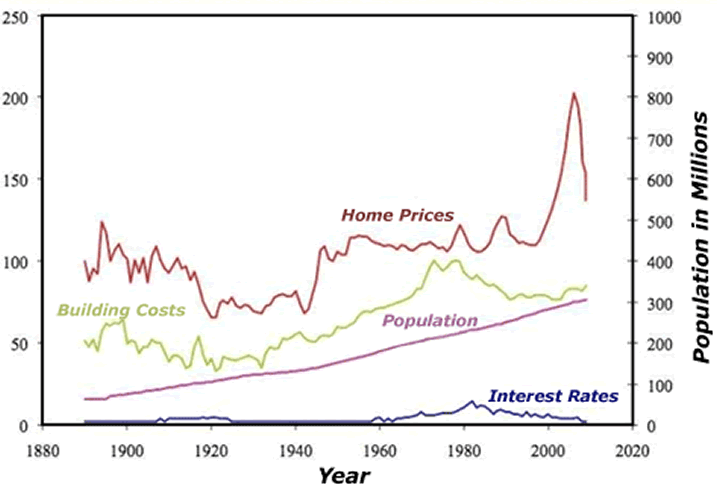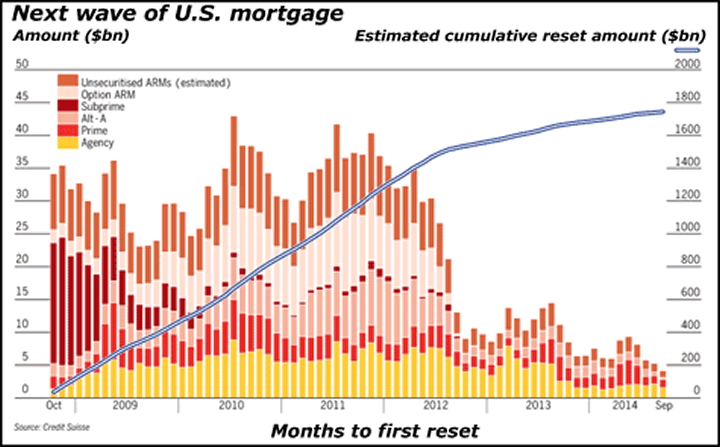The Great U.S. Housing Market Depression, America Stop Thinking about Homes as Investments
Housing-Market / US Housing Apr 28, 2009 - 07:21 AM GMTBy: Uncommon_Wisdom
 Sean Brodrick There’s something you need to do for your own mental health: Stop thinking about homes as investments.
Sean Brodrick There’s something you need to do for your own mental health: Stop thinking about homes as investments.
You know those guys who are trying to reinflate the housing bubble — Tim Geithner, Ben Bernanke, Larry Summers — President Obama’s posse of the ethically challenged? They’re not your friends.
They’re taking billions of dollars of your national wealth and transferring the loot to their Wall Street friends on the promise they can make things all better — the way they used to be.
America, it’s time to wake up and smell the coffee. The glory days of the housing bubble aren’t returning. You can wear a faded rose and pine for days gone by all you want, but your life will be much easier and stress-free if you can get the real estate monkey off your back.
The world has changed, and the days of flipping houses like rows of hamburgers are probably not coming back for a decade … maybe longer.
The good news is there are great places to put your money to work — and I’ll get to those. First, let’s deal with how we got here.
Time to Abandon False Hopes
The first two years after the bursting of the housing bubble saw home prices fall about 30 percent from their peak. And nothing goes down forever, right? That’s what you’re telling yourself, right, America? “Gosh darn it, prices are sure to rebound this year or next.”
As your friend, I have to tell you I think that outlook is pretty optimistic. Sure, maybe we’ll see home prices bottom sometime … in 2011 or 2012. But I’m not expecting a rubber-band bounce. And neither should you.
Let’s look at some of housing’s SHORT-term problems …
Reason #1: A Picture’s Worth a Thousand Words
Robert Schiller, an expert on housing prices and the author of “Irrational Exuberance” published a chart of how house prices behaved for the last 120 years (adjusted for inflation).

The house price line is on top. Prices are indexed against the 1890 price (left scale), and the chart is updated through the end of the fourth quarter of 2008. At that time, Schiller’s analysis suggested that home prices had to fall about 10 percent to 20 percent just to get back to fair value.
Never mind the price spike — THAT was the housing bubble. On a more historical (realistic) basis, home prices have risen annually in line with the Consumer Price Index. By 2009, the median value of a home, based on historical precedent, should have risen to $150,000. But at the end of 2008, the median value of a home was $180,000.
Sure, modern homes are bigger and more modern than they were in 1969. But you know what? They were bigger and more modern in 1969 than they were 40 years earlier. The only way home prices could rise in real dollars is if incomes were going up as well — and they’re not.
In short, while we could see temporary rallies, the easiest path for home prices is still down. And since there is usually overshoot to the downside after a bubble bursts, it could be much further down.
Reason #2: The Mortgage Default Tsunami
More than 2.3 million homeowners faced foreclosure proceedings in 2008, up more than 80 percent from 2007. A huge wave of ARM (Adjustable Rate Mortgage) resets started this year and will continue through mid-2012.

Source: Credit Suisse
This tsunami of mortgage resets is one of the reasons why President Obama created a $75 billion plan he says will prevent 7 million to 9 million foreclosures.
We aren’t going to discuss the morals of bailing out people who bought too much house — not enough time for that today. I will point out that of homes that were delinquent last year, and then were refinanced, more than half went back into foreclosure.
Also, 40 percent of the homes sold at the peak of the bubble were second homes or investment properties. They won’t be helped by Obama’s mortgage initiative.
Obama’s plan may ease some of the pain of the housing crisis, but won’t make it go away. And it will probably weigh on the economy for years to come.
There is some good news for the housing market. A subset of mortgages called Option Arms were supposed to reset this Spring, but that day of reckoning has been put off for thousands of homeowners by as much as one year, according to Credit Suisse.
The reason is that falling interest rates have delayed the loan balances hitting specified principal caps that would trigger a reset of the loan — typically 110 percent to 125 percent of the original principal.
The bad news: The big tsunami of unsecuritized ARMs, subprime loans, Alt-A, prime and agency loans will continue.
What’s more, the pain for Options ARMs is only being delayed. Credit Suisse estimates that the resets will begin to accelerate next spring, rising from about $4 billion resetting in March 2010 to a peak of $14 billion in September 2011. The current level is about $1 billion. About $500 billion of option ARM loans are outstanding, according to the bank.
These two forces should weigh on home prices going forward, even if the economy recovers during that time. A lackluster economic recovery, naturally, will also throw cold water on the housing market.
But even AFTER those two problems are worked out, there are five other longer-term reasons why the housing bubble — or any bubble — won’t be reflating any time soon.
Reason #3: Deflation Hammers Home Prices
Deflation is here and is grinding prices lower. In the U.S., consumer prices dropped 0.4 percent in March compared to a year earlier — the first year-on-year drop since August 1955.
That’s on the heels of February’s drop in personal income — down $29.1 billion. Wages should come under increasing pressure as employment declines — we recently saw employment drop by the largest amount since current data series began in 1949.
In March the unemployment rate stood at 8.5 percent, up from a cyclical low of 4.4 percent. This is the highest level since the early 1980s.
Deflation is terrible for home prices — as wages fall, rents follow, and home prices tag along.
Reason #4: Inflation Won’t Help
Our current bout of deflation is probably going to end in inflation. In the past year, the Fed’s balance sheet, as measured by the monetary base, has nearly doubled from $826 billion last March to $1.64 trillion, with much larger increases coming down the pike. This is inflationary — and if the economy bottoms, we could see inflation ignite.
That means even if your home value goes up, it’s struggling to keep pace in real terms. And if your home price doesn’t go up, that will be even worse.
Here’s an example why: The Dow Jones Industrial Average hit 1,000 in 1966. It didn’t get there again for 7 years — 1973. The inflation from 1966 to 1973 was 37 percent. So investors may have made the same paper gains, but in real dollars, they were losing money.
Reason #5: The Next Bubble WON’T Be a Housing Bubble
The implosion of the Tulip Mania in Holland and the South Seas bubble were not followed by reinflation of tulip prices or shares of the South Seas Company stock.
Likewise, after the Dot-com bubble burst, the Nasdaq didn’t reflate. There are stocks from the dot-com daze that are far from their old highs … and will likely never see them again. And some — Pets.com comes to mind — disappear forever.
Reason #6: The Fraudulent Good-Time Charlie Gravy Train Ain’t Comin’ Back
Low interest rates were only one factor in the housing bubble; the other was loose lending standards. Heck, they weren’t just loose, there was wholesale fraud going on.
Now, with regulators and Congress breathing down their necks, mortgage lenders are likely to button up their standards tighter than a nun’s pajamas.
That’s a bit like closing the barn door after the horse is out, but it means the ingredients for a housing bubble just aren’t there anymore. Speaking of that …
Reason #7: America is Getting Older
A great wall of baby boomers, born between 1946 and 1964, are approaching retirement age. The oldest baby boomers turn 63 in 2009, and when the trend peaks in 2030, the number of people over age 65 will zoom to 71.5 million — one in every five Americans.
Old people don’t need huge homes. You know — the kind of McMansions we’ve been building for the past 20 years.
And while the inventory of U.S. single-family homes, townhouses and condominiums decreased to a 9.7 month supply in February — down from 11.3 months in April last year — that’s STILL a lot of unsold inventory on the market.
How Long Could Home Prices Stay Depressed?
MAYBE we’ll see home prices recover in 2012. Or maybe it will take a LOT longer. Studies show that of the last three up waves in housing prices, 1942-1956, 1975-1979 and 1985-1989, it took the run-up time plus 30 percent before housing prices started to move up again.
Since this last housing bull market went from (roughly) 1997-2007, the housing prices won’t start a significant run-up until 2020.
And what will inflation do to the value of your home by then?
Now for the good news.
What, you thought I was going to dump all this on you and not tell you what you SHOULD be investing in?
Here are a couple of ideas …
Pick #1: The PowerShares DB Base Metals Fund (DBB). Base metals have based nicely in recent weeks, buoyed by bullish buying trends in China. The Chinese have $1.9 trillion in foreign reserves, and they’re using them to buy raw materials while they’re cheap.
Last weekend, Chinese Premier Wen Jiabao said his country’s stimulus package is working and the economy is “better than expected.”
While he cautioned that complete recovery will take much more time because the global financial crisis continues to spread, he also pledged to pull the country out of its slump by, among other efforts, expanding domestic demand and building major infrastructure projects.
You know what more infrastructure projects and consumer demand in China means. Chinese imports of iron ore are soaring, hitting a record in March. Chinese imports of copper are also soaring, and they’re gobbling up base metals as well.
I think you can buy the DBB anytime. My Red-Hot Commodity ETFs service holds it now.
Pick #2: Gold. An easy way to buy gold is the SPDR Gold Trust (GLD). Gold is in a consolidation mode right now, but I expect support between $765 and $800 to kick in. And that would be a buying opportunity for the precious metal. Gold will be excellent insurance for any portfolio if inflation kicks in the way I think it will. And it holds its value during deflationary times as well.
All the best,
Sean
P.S. For daily updates on gold and more, check out my new blog at http://blogs.uncommonwisdomdaily.com/red-hot-energy-and-gold/
This investment news is brought to you by Uncommon Wisdom. Uncommon Wisdom is a free daily investment newsletter from Weiss Research analysts offering the latest investing news and financial insights for the stock market, precious metals, natural resources, Asian and South American markets. From time to time, the authors of Uncommon Wisdom also cover other topics they feel can contribute to making you healthy, wealthy and wise. To view archives or subscribe, visit http://www.uncommonwisdomdaily.com.
Uncommon Wisdom Archive |
© 2005-2022 http://www.MarketOracle.co.uk - The Market Oracle is a FREE Daily Financial Markets Analysis & Forecasting online publication.



